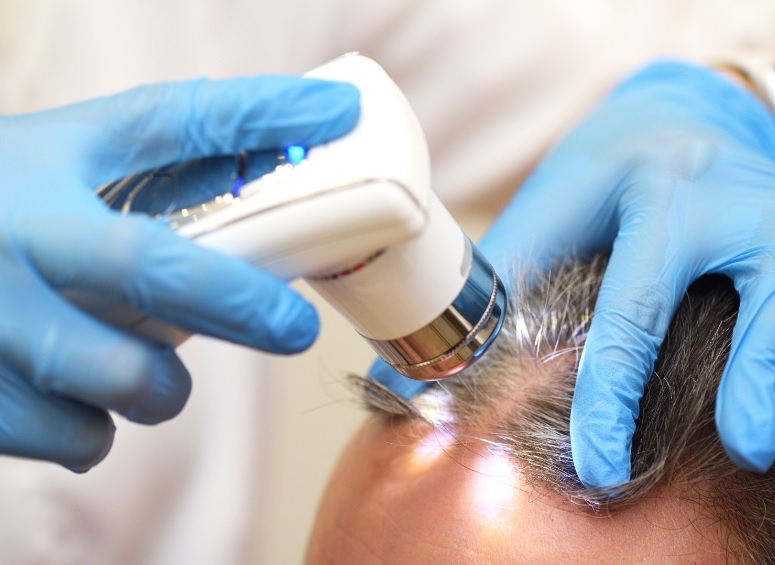
Hair loss affects over half of women by the age of 40. Most women tend to experience hair thinning as they approach middle age, but some women experience hair thinning much sooner.
With no cure for hair loss, it can be difficult to know how best to go about the issue. Treatments are available that can help reduce hair thinning and promote healthier hair growth, however, the field is so vast that it’s tough to know what treatments to try.
This is why it could well be worth consulting with a trichologist, in order to diagnose what’s causing your hair to fall out, and work out a best treatment plan.
What is a trichologist?
A trichologist is a specialist who focuses on the study of hair and scalp health. They are trained to diagnose and treat various conditions related to hair and scalp, including hair loss, hair thinning, scalp diseases, and disorders like dandruff, psoriasis, and seborrheic dermatitis. The field of trichology is considered a branch of dermatology, but trichologists specifically concentrate on hair and scalp issues.
Here are some key aspects of what trichologists do:
Diagnosis
Trichologists are skilled in identifying the causes of hair and scalp issues. This involves a detailed examination of the patient’s hair and scalp, medical history, lifestyle factors, and sometimes, laboratory tests.
Treatment Plans
Based on the diagnosis, trichologists create personalized treatment plans. These can include topical treatments, nutritional advice, lifestyle changes, and sometimes, referrals to other healthcare professionals if underlying medical conditions are suspected.
Hair Care Advice
They provide guidance on proper hair care routines, including the use of specific hair products, techniques to prevent hair damage, and recommendations for maintaining healthy hair and scalp.
Management of Hair Loss
Trichologists offer various treatments for hair loss, which may include topical applications, low-level laser therapy, and advice on hair restoration options such as hair transplants.
Scalp Treatments
For scalp conditions, trichologists may use or recommend specialized treatments and products designed to address issues like dandruff, scalp infections, and inflammatory scalp conditions.
Educational Role
Trichologists often educate their clients about the importance of nutrition, lifestyle, and overall health in maintaining healthy hair and scalp. They might also provide information on how to manage stress, which can be a contributing factor to hair loss and scalp problems.
While trichologists are not medical doctors, they play a critical role in the multidisciplinary approach to hair and scalp health, often working alongside dermatologists, endocrinologists, and other healthcare professionals to provide comprehensive care.
When you should see with a trichologist about your thinning hair
Seeing a trichologist about hair loss can be beneficial in several situations. Here are some specific instances when you might consider consulting one:
Noticeable Hair Thinning or Bald Spots
If you observe significant thinning of your hair or bald patches, it’s a good idea to consult a trichologist. Early intervention can help identify the cause and potentially mitigate further loss.
Sudden or Rapid Hair Loss
If you experience a sudden or rapid loss of hair, it could indicate an underlying health issue or severe stress. A trichologist can help determine the cause and recommend appropriate treatment.
Scalp Issues
Conditions like severe dandruff, itching, redness, or scalp infections should prompt a visit to a trichologist. These issues can sometimes lead to hair loss if left untreated.
Postpartum Hair Loss
Many women experience hair loss after childbirth. If the hair loss is excessive or prolonged, a trichologist can provide guidance on how to manage and reduce it.
Hair Loss with Other Symptoms
If hair loss is accompanied by other symptoms like fatigue, weight changes, or skin problems, it might indicate an underlying condition such as a thyroid disorder or nutritional deficiency. A trichologist can help in identifying these issues.
Genetic Predisposition
If there’s a family history of hair loss, consulting a trichologist can help in understanding your risk and exploring preventive measures.
Hair Loss Due to Medical Treatments
If you’re undergoing medical treatments like chemotherapy that cause hair loss, a trichologist can offer advice on how to care for your hair and scalp during and after treatment.
Persistent Hair Shedding
If you notice a significant amount of hair shedding over a prolonged period, even if it’s diffuse, a trichologist can help diagnose the issue and suggest treatments to manage it.
Ineffective Over-the-Counter Treatments
If you’ve tried over-the-counter treatments without success, a trichologist can provide more specialized options.
Desire for Expert Opinion
Sometimes, it’s simply beneficial to seek the expertise of a trichologist for personalized advice and treatment plans based on the latest research and techniques in hair care and restoration.
Trichologists are specialised in the science of the hair and scalp and can offer a more detailed and targeted approach compared to general practitioners or dermatologists when it comes to hair loss issues.


Leave a Reply